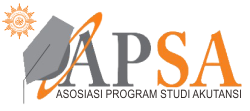THE AUDIT EXPERIENCE AS A MODERATING THE EFFECT OF E-AUDIT IMPLEMENTATION AND THE AUDIT’S WORKING ENVIRONMENT ON THE QUALITY OF AUDIT FINDINGS IN THE FRAUD AUDITING
Yuli Tri Cahyono(1*), Devy Anggraeni Widya Putri(2), Nashirotun Nissa Nurharjanti(3)(1) Department of Accounting, Faculty of Economics and Business, Universitas Muhammadiyah Surakarta, Indonesia,
(2) Department of Accounting, Faculty of Economics and Business, Universitas Muhammadiyah Surakarta, Indonesia,
(3) Department of Accounting, Faculty of Economics and Business, Universitas Muhammadiyah Surakarta, Indonesia,
(*) Corresponding Author
Abstract
The maximum quality of audit findings in fraud auditing is inseparable from the implementation of e-Audit and its implementation requires a good audit work environment. There is an indication of the decreasing trust of beneficiaries in the reliability of audit results due to the increasing number of bribery cases against auditors. This study aims to examine the audit experience as moderating the application of e-Audit and the audit work environment on the quality of audit findings in fraud auditing. The population in this study was the Audit Board of the Republic of Indonesia (AKN 1) in 2020. The method used for sampling was purposive sampling and it was obtained a sample of 30 respondents. The data were analyzed using multiple linear regression analysis methods and moderate regression analysis with the assistance of the SPSS 25 program. The results of this study indicated that there was a positive significance in the application of e-Audit and the audit work environment on the quality of audit findings in fraud auditing, and audit experience did not moderate this research model. Based on the research results, it is concluded that the application of e-Audit and the audit work environment had an effect on the quality of audit findings in fraud auditing, and audit experience did not moderate the application of e-Audit and the audit work environment on the quality of audit findings in fraud auditing
Full Text:
PDFReferences
Agung, Gusti, Rai. 2008. Audit Kinerja Pada Sektor Publik: Konsep Praktik Studi Kasus. Publisher: Salemba Empat.
Anatia Agusti , 2018 Pengaruh Independensi Eksternal Auditor Tehadap Kualitas Audit (Studi Kasus Pada Kantor Akuntan Publik Di Padang) Universitas Putra Indonesia YPTK Padang Journal of RESIDU, Volume 2, Issue 6, June 2018 ISSN PRINT : 2598-814X ISSN ONLINE : 2598-8131
Annisa Rachmania 2017, Analisis Pengaruh Fraud Triangle Terhadap Kecurangan Laporan Keuangan Pada Perusahaan Makanan dan Minuman Yang Terdaftar di Bursa Efek Indonesia Periode 2013-2015 Universitas Pakuan Bogor
Arens, A.Alvin., Elder, R.J., Beasley, M.S., Amir Abadi Jusuf. 2009. Audit dan Jasa Assurance: Pendekatan Terpadu (Adaptasi Indonesia). Jakarta: Salemba Empat.
Bodnar, George H and William S Hopwood, 2006. Sistem Informasi Akuntansi. Publisher: ANDI, Yogyakarta.
Duff, A. 2009.”Measuring Audit Quality in Era of Change (An Empirical Investigation of UK Audit Market Stakeholders in 2002 and 2005).”Managerial Auditing Journal, Vol.24, No.5
Ghozali, Imam. 2016 Aplikasi Analisis Multivariate dengan Program IBM SPSS 21 Update PLS Regresi. Semarang: Publishing Agency of Universitas Diponegoro
Gondodiyoto, S., 2007, Audit Sistem Informasi: Pendekatan Cobit, Edisi Revisi,. Mitra Wacana Media, Jakarta.
Hartoyo, Agung Dwi. 2011. Upaya Peningkatan Kinerja Pemeriksa BPK RI Menggunakan Computer assisted audit technique. E-Indonesia Initiative 2011 (ell2011). Konferensi Teknologi Informasi dan Komnikasi untuk Indonesia. Bandung.
Hery. 2017. Auditing dan Asurans : Pemeriksaan Akuntansi Berbasis Standar Audit Internasional, Grasindo, Jakarta.
IASSB. 2014, ISA 200: Overall objectives of the independent auditor and The Conduct of An Audit in Accordance with the International Standards of Auditing IFAC, New York
Institut Akuntan Publik Indonesia (IAPI). (2013). “Standar Profesional Akuntan Publik
”. Jakarta: Salemba Empat.
Komite SPAP Ikatan Akuntan Indonesia (IAI), (2001), Standar Profesional Akuntan Publik. Jakarta : Salemba Empat
Marshall B. Romney dan Paul John Steinbart. 2014 Sistem Informasi Akuntansi: Accounting Information Systems (Edisi 13), Prentice Hall.
Rahayu, Titin dan Bambang Suyono. 2016. Pengaruh Independensi Auditor, Etika Auditor, dan Pengalaman Auditor Terhadap Kualitas Audit. Jurnal Ilmu dan Riset Akuntansi, Volume 5 Nomor 4.
Sedarmayanti, (2010). Manajemen Sumber Daya Manusia, Reformasi Birokrasi dan Manajemen Pegawai Negri Sipil. Bandung: PT Refika Aditama
Shelby Defiany Alou, dkk. 2017 Pengaruh Kesesuaian Kompensasi, Moralitas Manajemen, Dan Keefektifan Pengendalian Internal Terhadap Kecenderungan Kecurangan Akuntansi Pada Perusahaan Konstruksi Di Manado Fakultas Ekonomi dan Bisnis, Jurusan Akuntansi, Universitas Sam Ratulangi, Jurnal Riset Akuntansi Going Concern 12(1), 2017, 139-148
Singgih, Elisha Muliani, dan Icuk Rangga Bawono. 2010. Pengaruh Independensi, Pengalaman, Due Profesional Care dan Akuntabilitas Terhadap kualitas Audit (Studi pada Auditor di KAP “Big Four” Indonesia). Simposium Nasional Akuntansi XIII. Purwokerto.
Sugiyono. 2016. Metode Penelitian Pendidikan Pendekatan Kuantitatif, Kualitatif, dan R&D. Bandung: Alfabeta.
Badan Pemeriksa Keuangan Republik Indonesia. Ikhtisar Hasil Pemeriksaan. https://www.bpk.go.id/ihps
Article Metrics
Abstract view(s): 1303 time(s)PDF: 1254 time(s)
Refbacks
- There are currently no refbacks.


















